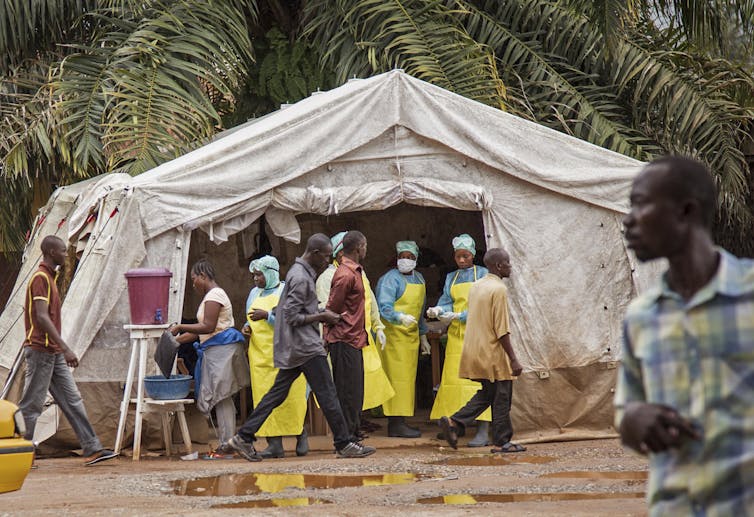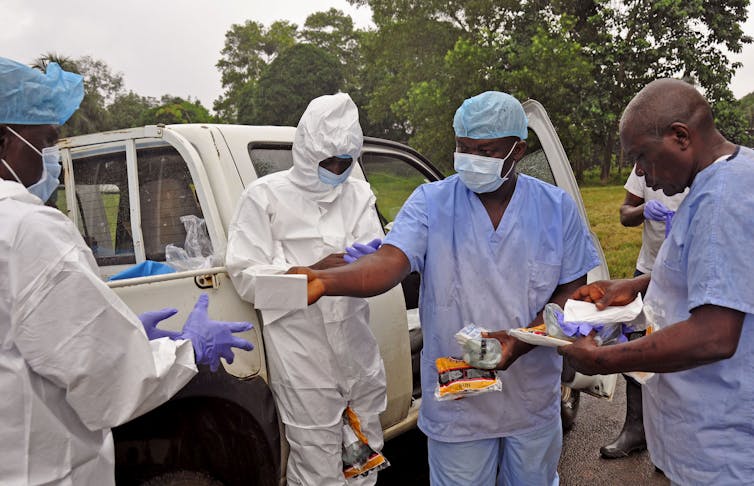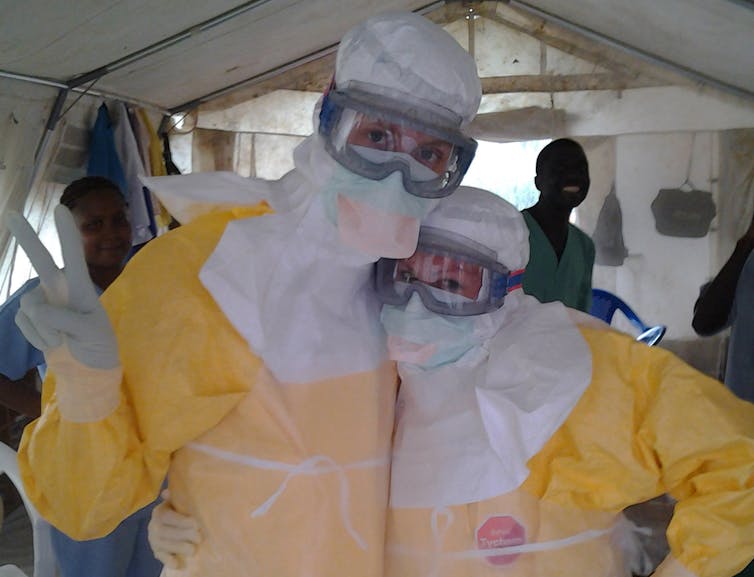When medical workers behave badly during disease outbreaks, everyone suffers
- Written by Lara Salahi, Assistant Professor of Broadcast and Digital Journalism, Endicott College
When a deadly infectious disease takes hold in a population, outbreak responders do their best to save lives and stamp out the contagion. No matter the disease or the location – whether AIDS in the U.S., SARS in China, or cholera in Yemen or Haiti – the public narrative of an outbreak often unfolds in a familiar way. An unruly and potentially fatal disease emerges and sets off a race against the clock to stop its spread, with limited or no certain treatment.
Less widely known is the shared secret among outbreak responders: Bad behavior among their own ranks can consume undue energy amid an already frightening scenario.
 In an outbreak, the stakes are life and death and tensions can run high.
AP Photo/ Michael Duff[1]
In an outbreak, the stakes are life and death and tensions can run high.
AP Photo/ Michael Duff[1]
We’ve both seen firsthand different elements of disorder during disease outbreaks. One of us (Pardis) led a team working in Sierra Leone tracking genomic changes in the virus during the 2014 Ebola epidemic and experienced how off-the-charts stress led to a toxic setting. As a journalist, one of us (Lara) witnessed the ensuing chaos as the media and health agencies worked to communicate Ebola risk to a fearful public. Together, we decided to try to learn more about the irrational behaviors that occur in the midst of an outbreak.
In a first attempt to move beyond open secrets to full transparency, we conducted an anonymous survey in 2015 of more than 200 local and foreign responders to the Ebola epidemic in West Africa. This was the largest and most widespread Ebola outbreak[2] in history. Nearly 30,000 people were infected with the virus, and more than 11,000 people died in the three hardest-hit countries: Sierra Leone, Liberia and Guinea. We asked responders about their experiences during the height of the outbreak.
What they told us led us to believe that a culture can form in this environment, created by individual actors and larger agents. It has little to do with the virus but can propagate its spread. As we describe in our new book “Outbreak Culture[3],” these dynamics dictate how the international community responds to a pathogen. Outbreak culture can inhibit efficient action and, in some cases, even make the epidemic worse.
Talking about what’s not working
Outbreak culture is what we call the collective mindset that can emerge in the beginning stages of a disease outbreak among those trying to respond to it. It forms in the crucible of a chaotic, unpredictable and potentially fatal environment. People’s initial reactions and behaviors may be based on fear, on the instinct to protect oneself or other people or institutions, or on the desire to exploit an already confusing situation.
Nearly all our survey respondents had found that political and interpersonal challenges slowed them down. Public conflicts between international response agencies “led to a delay in response activities, duplication of activities and lack of communication of important information,” one survey respondent wrote. For example, because many agencies came in with their own set of protocols, some said that continuous turnover of responders at different agencies prevented communicating or developing standards that were practiced throughout the response.
Delays were especially detrimental to scientists on the ground who were conducting research in the midst of the outbreak. The 2014 Ebola epidemic was among the first outbreaks during which rigorous field research[4] to analyze transmission routes[5] and to test experimental therapies happened while the outbreak was still in full swing.
“Initially, it was difficult as everyone was concern[ed] about their turf and getting the glory,” another wrote.
The harmful competitive environment coupled with the chaos of Ebola spreading, one respondent wrote, led to “manipulation of data for publication” even though the study in question wasn’t actually conducted. Another reported witnessing data collectors attempt to obtain specimens from patients “in an unethical way and without cultural sensitivity.”
Indeed, more than a quarter of survey respondents reported either witnessing, hearing about, or falling victim to illegal or unethical tactics while working in their respective capacities to the response.
Other responses highlighted the misuse of equipment. Some workers took advantage of humanitarian funds by “renting” cars that did not exist, or buying fuel for personal cars.
“I saw staff who [were] in theory on pay by the international community but who would then not show [up] to work,” one respondent wrote.
 Appropriate protective gear is vital for all responders during an Ebola outbreak.
AP Photo/Abbas Dulleh[6]
Appropriate protective gear is vital for all responders during an Ebola outbreak.
AP Photo/Abbas Dulleh[6]
“I was witness to international agencies’ knowing deployment of substandard PPE [personal protective equipment] that did not meet specifications to protect healthcare workers from infection,” wrote another respondent, not specifying the name of the agencies or the brand of equipment. “These national staff, then, did not have access to high-level Ebola care if they were infected.”
Additional accounts mentioned health workers misusing equipment and providing preferential treatment to selected families. Several respondents saw local leaders leave their posts to protect themselves: “I witnessed government health workers in a supervisory capacity who had left their post, leaving subordinates to assume the risk and responsibility for caring for people with [Ebola].” This choice, like many others, was probably motivated by fear of the virus.
Survey snapshots can lead to change
Our survey included only a fraction of the thousands of people who responded to the Ebola outbreak[7] and we understand their sentiments may not be representative of all responders. More foreign responders participated in the survey than local health workers. Both groups’ experiences are essential to improving outbreak culture.
 International volunteers are only part of the response story.
AP Photo[8]
International volunteers are only part of the response story.
AP Photo[8]
Two important aspects of our survey are that it was anonymous, so participants were able to respond freely, and it was blameless, asking participants to offer solutions to improve the culture of outbreak response rather than name offenders.
Our aim was to get a representative, honest glimpse into some shared experiences and challenges of outbreak response. It follows the principles of truth and reconciliation – or the Sierra Leonean practice of “Fambul Tok,” which translates to “family talk.” This tradition does not seek punishment, but a collective move toward a better community.
In the same way, we imagine that creating an exit survey to “check the temperature” of all responders in real-time as they return from a hot zone or in the midst of their work is a beneficial way to make adjustments to response operations as they’re happening.
In “Outbreak Culture[9],” we document that many of the same obstacles[10] occurred during other disease outbreaks in other regions of the world prior to the 2014 Ebola outbreak. We are now seeing them re-emerge as the world faces another daunting Ebola outbreak, this time in the Democratic Republic of Congo[11] where responders are being met with increased hostility and violence.
It’s time to take a sober look at even the most devastating facts of the medical community’s outbreak culture. This can be a critical step toward creating a new version that will allow responders to beat the next disease outbreak.
References
- ^ AP Photo/ Michael Duff (www.apimages.com)
- ^ largest and most widespread Ebola outbreak (www.cdc.gov)
- ^ Outbreak Culture (www.hup.harvard.edu)
- ^ field research (doi.org)
- ^ transmission routes (doi.org)
- ^ AP Photo/Abbas Dulleh (www.apimages.com)
- ^ responded to the Ebola outbreak (www.who.int)
- ^ AP Photo (www.apimages.com)
- ^ Outbreak Culture (www.hup.harvard.edu)
- ^ same obstacles (www.nytimes.com)
- ^ this time in the Democratic Republic of Congo (www.who.int)
Authors: Lara Salahi, Assistant Professor of Broadcast and Digital Journalism, Endicott College

